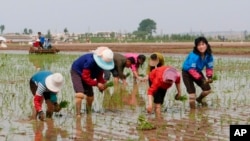The International Federation of Red Cross and Red Crescent Societies is warning about increased hunger, malnutrition, and waterborne diseases in North Korea due to a poor early harvest.
North Korea's expected June-to-September harvest has been cut in half due to an early spring drought. The International Red Cross Federation reports the destruction of crops is having a devastating impact on thousands of the most vulnerable people.
It says the elderly, families with young children, breast-feeding mothers, those suffering from chronic illnesses or disabilities are in desperate need.
Red Cross spokesman Matthew Cochrane said the humanitarian situation for many communities across North Korea is extremely critical. He said the U.N. estimates more than 40 percent of the population, around 11 million people, is in need of food aid.
"It has been and remains one of the world's truly silent humanitarian emergencies," he told VOA "The work that we are doing now really is about trying to help very vulnerable communities survive the coming weeks and months, but it is a drop in the ocean, I think and much more support is needed."
Cochrane said 20 percent of North Korea's children are malnourished. He warned the current food crisis is likely to lead to rising malnutrition rates and water borne diseases, such as diarrhea and colitis.
"Often you see in a drought [a] situation where — obviously there is a lack of water — the water that is available is polluted, is not really fit for human consumption," he said. "But people really have no choice but to consume that water. So, by providing clean water, not just for the crops but also for all the people, we hope to have the added benefit of improving crop yields and improving food security. But also helping protect people against waterborne illnesses."
The Red Cross Federation is appealing for nearly $500,000 to provide life-saving assistance for thousands of people in the most affected communities in North Phyongan province.
Given the severity of the situation, it says quick action is needed to save what can be saved from the failed harvest and to ensure that people whose food stocks are almost gone do not go hungry.




